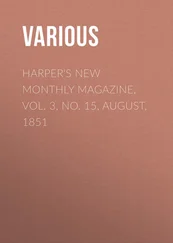Various - Harper's New Monthly Magazine, Vol. 1. No 1, June 1850
Здесь есть возможность читать онлайн «Various - Harper's New Monthly Magazine, Vol. 1. No 1, June 1850» — ознакомительный отрывок электронной книги совершенно бесплатно, а после прочтения отрывка купить полную версию. В некоторых случаях можно слушать аудио, скачать через торрент в формате fb2 и присутствует краткое содержание. Издательство: Иностранный паблик, Жанр: periodic, foreign_edu, на английском языке. Описание произведения, (предисловие) а так же отзывы посетителей доступны на портале библиотеки ЛибКат.
- Название:Harper's New Monthly Magazine, Vol. 1. No 1, June 1850
- Автор:
- Издательство:Иностранный паблик
- Жанр:
- Год:неизвестен
- ISBN:нет данных
- Рейтинг книги:5 / 5. Голосов: 1
-
Избранное:Добавить в избранное
- Отзывы:
-
Ваша оценка:
- 100
- 1
- 2
- 3
- 4
- 5
Harper's New Monthly Magazine, Vol. 1. No 1, June 1850: краткое содержание, описание и аннотация
Предлагаем к чтению аннотацию, описание, краткое содержание или предисловие (зависит от того, что написал сам автор книги «Harper's New Monthly Magazine, Vol. 1. No 1, June 1850»). Если вы не нашли необходимую информацию о книге — напишите в комментариях, мы постараемся отыскать её.
Harper's New Monthly Magazine, Vol. 1. No 1, June 1850 — читать онлайн ознакомительный отрывок
Ниже представлен текст книги, разбитый по страницам. Система сохранения места последней прочитанной страницы, позволяет с удобством читать онлайн бесплатно книгу «Harper's New Monthly Magazine, Vol. 1. No 1, June 1850», без необходимости каждый раз заново искать на чём Вы остановились. Поставьте закладку, и сможете в любой момент перейти на страницу, на которой закончили чтение.
Интервал:
Закладка:
Yielding to these entreaties, and amused at the prospect of a novel scene, we mounted our horses and cantered to the fort. The lights were burning brightly in the bazaars as we rode through them, and except a few groups gathered to discuss the price of rice and the want of rain, we perceived no agitation till we reached the Vakeel's house. Arrived here we dismounted, and on entering the square court-yard a scene of indescribable confusion presented itself. The first impression it produced on me was that of entering a large aviary in which the birds, stricken with terror, fly madly to and fro against the bars. Such was the first effect of our entrance. Women and girls of all ages, grouped about the court, in most picturesque attitudes, started up and fled to its extreme end; only a few of the more matronly ladies stood their ground, and with terribly screeching voices, declaimed against some one or something, but for a long time we could, in this Babel of female tongues, distinguish nothing. At last we managed to distinguish the rajah's name, coupled with epithets most disrespectful to royalty. This, and that they, the women, begged instantly to be put to death, was all that the clamor would permit us to understand. We looked appealingly at Veneat Rao, who stood by, wringing his hands. However, he made a vigorous effort, and raising his shrill voice, told them that the sahibs had come purposely to listen to, and redress their grievances, and that they would hold durbar (audience) then and there.
This announcement produced a lull, and enabled us to look round us at the strange scene. Scattered in various parts of the court were these poor prisoners, who now for the first time for many years tasted liberty. Scattered about were some hideous old women, partly guardians of the younger, partly remains, we were told, of the rajah's father's seraglio. Young children moved among them looking very much frightened. But the group which attracted our attention and admiration consisted of about twenty really beautiful girls, from fourteen to eighteen years of age, of every country and caste, in the various costume and ornament of their races; these were clustering round a fair and very graceful Mahratta girl, whose tall figure was seen to great advantage in the blaze of torchlight. Her muslin vail had half fallen from her face, allowing us to see her large, soft, dark eyes, from which the tears were fast falling, as in a low voice she addressed her fellow-sufferers. There was on her face a peculiar expression of patient endurance of ill, inexpressibly touching. This is not an unfrequent character in the beauty of Asiatic women; the natural result of habits of fear, and the entire submission to the will of others.
Her features were classically regular, with the short rounded chin, the long graceful neck, and that easy port of head so seldom seen except in the women of the East. Her arms were covered with rich bracelets, and were of the most perfect form; her hands long and tapering, the palms and nails dyed with the "henna." No barbarously-civilized restraint rendered her waist a contradiction of natural beauty; a small, dark satin bodice, richly embroidered, covered a bosom which had hardly attained womanly perfection; a zone of gold held together the full muslin folds of the lower portion of her dress, below which the white satin trowsers reached, without concealing a faultless ankle and foot, uncovered, except by the heavy anklet and rings which tinkled at every step she took. After the disturbance that our entrance had caused, had in a measure subsided, the children, who were richly dressed and loaded with every kind of fantastic ornament, came sidling timidly round us, peering curiously with their large black eyes, at the unusual sight of white men.
Considerably embarrassed at the very new arbitration which we were about to undertake, B. and I consulted for a little while, after which, gravely taking our seats, and Veneat Rao having begged them to listen with respectful attention, I, at B.'s desire, proceeded to address them, telling them,
"That we supposed some grave cause must have arisen for them to desert the palace of the rajah, their protector, during his absence, and by violently overpowering the guard, incur his serious anger (here my eye caught a sight of the said guard, consisting of two blear-eyed, shriveled old men, and I nearly lost all solemnity of demeanor) that if they complained of injustice, we supposed that it must have been committed without his highness's knowledge, but that if they would quietly return to the hareem we would endeavor to represent to their master their case, and entreat him to redress their grievance."
I spoke this in Hindusthani, which, as the lingua franca of the greater part of India, I thought was most likely to be understood by the majority of my female audience. I succeeded perfectly in making myself understood, but was not quite so successful in convincing them that it was better that they should return to the rajah's palace. After rather a stormy discussion, the Mahratta girl, whom we had so much admired on our entrance, stepped forward, and, bowing lowly before us, and crossing her arms, in a very sweet tone of voice proceeded to tell her story, which, she said, was very much the history of them all. The simple, and at times picturesque expressions lose much by translation.
"Sir, much shame comes over me, that I, a woman, should speak before men who are not our fathers, husbands, nor brothers, who are strangers, of another country and religion; but they tell us that you English sahibs love truth and justice, and protect the poor.
"I was born of Gentoo parents – rich, for I can remember the bright, beautiful jewels which, as a child, I wore on my head, arms, and feet, the large house and gardens where I played, and the numerous servants who attended me.
"When I had reached my eighth or ninth year I heard them talk of my betrothal, 1 1 The usual age for the ceremony among the wealthy India.
and of the journey which we were, previous to the ceremony, to take to some shrine in a distant country. My father, who was advancing in years, and in bad health, being anxious to bathe in the holy waters, which should give him prolonged life and health.
"The journey had lasted for many days, and one evening after we had halted for the day I accompanied my mother when she went to bathe in a tank near to our encampment. As I played along the bank and picked a few wild flowers that grew under the trees I observed an old woman advancing toward me. She spoke to me in a kind voice, asked me my name? who were my parents? where we were going? and when I had answered her these questions she told me that if I would accompany her a little way she would give me some prettier flowers than those I was gathering, and that her servant should take me back to my people.
"I had no sooner gone far enough to be out of sight and hearing of my mother than the old woman threw a cloth over my head, and taking me up in her arms, hurried on for a short distance. There I could distinguish men's voices, and was sensible of being placed in a carriage, which was driven off at a rapid pace. No answer was returned to my cries and entreaties to be restored to my parents, and at sunrise I found myself near hills which I had never before seen, and among a people whose language was new to me.
"I remained with these people, who were not unkind to me, three or four years; and I found out that the old woman who had carried me off from my parents, was an emissary sent from the rajah's hareem to kidnap, when they could not be purchased, young female children whose looks promised that they would grow up with the beauty necessary for the gratification of the prince's passions.
"Sahibs! I have been two years an inmate of the rajah's hareem – would to God I had died a child in my own country with those I loved, than that I should have been exposed to the miseries we suffer. The splendor which surrounds us is only a mockery. The rajah, wearied and worn out by a life of debauchery, takes no longer any pleasure in our society, and is only roused from his lethargy to inflict disgrace and cruelties upon us. We, who are of Brahmin caste, for his amusement, are forced to learn the work of men – are made to carry in the gardens of the hareem a palanquin, to work as goldsmiths – and, may our gods pardon us, to mingle with the dancing-girls of the bazaar. His attendants deprive us even of our food, and we sit in the beautiful palace loaded with jewels, and suffer from the hunger not felt even by the poor Pariah.
Читать дальшеИнтервал:
Закладка:
Похожие книги на «Harper's New Monthly Magazine, Vol. 1. No 1, June 1850»
Представляем Вашему вниманию похожие книги на «Harper's New Monthly Magazine, Vol. 1. No 1, June 1850» списком для выбора. Мы отобрали схожую по названию и смыслу литературу в надежде предоставить читателям больше вариантов отыскать новые, интересные, ещё непрочитанные произведения.
Обсуждение, отзывы о книге «Harper's New Monthly Magazine, Vol. 1. No 1, June 1850» и просто собственные мнения читателей. Оставьте ваши комментарии, напишите, что Вы думаете о произведении, его смысле или главных героях. Укажите что конкретно понравилось, а что нет, и почему Вы так считаете.












